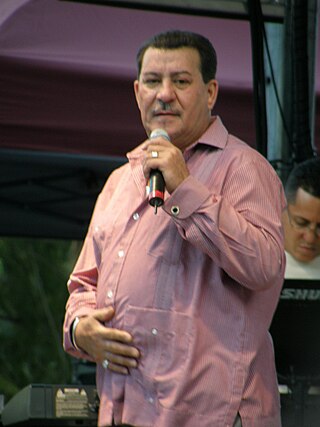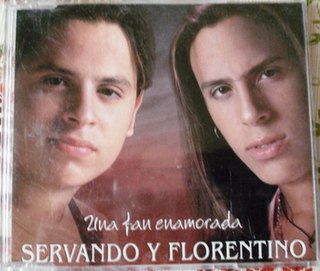Related Research Articles

Julio César "Tito" Rojas López, also known as "El Gallo Salsero", was a Puerto Rican salsa singer and songwriter.
The 18th Lo Nuestro Awards was held on February 23, 2006 at the American Airlines Arena in Miami. The nominees were announced on December 12, 2005, during a press conference televised live on the Univision Network morning show ¡Despierta América!. The show was co-hosted by René Strickler and Patricia Manterola.

Marco Antonio Solís Sosa is a Mexican musician, singer-songwriter, and record producer. Born and raised in Ario de Rosales, Michoacán, Solís began his musical career at the age of six, performing with his brother Joel Solís as Los Hermanitos Solís. In 1975, he co-founded Los Bukis, of which he was the lead vocalist, songwriter and guitarist. The band split up after nearly two decades of success, with Solís pursuing a solo career. Solís released his debut solo album, En Pleno Vuelo, in 1996 by Fonovisa Records.

Juan Luis Morera Luna, best known by his stage name Wisin, is a Puerto Rican reggaeton rapper, singer and record producer, best known as a member of the reggaeton duo Wisin & Yandel. Wisin is noted for his unique and aggressive style of rapping.

Jencarlos Canela is an American actor and singer. Canela starred in the telenovela Mi corazón insiste en Lola Volcán, and two other telenovelas.
The Lo Nuestro Award for Pop Song of the Year is an honor presented annually by American television network Univision at the Lo Nuestro Awards. The accolade was established to recognize the most talented performers of Latin music. The nominees and winners were originally selected by a voting poll conducted among program directors of Spanish-language radio stations in the United States and also based on chart performance on Billboard Latin music charts, with the results being tabulated and certified by the accounting firm Deloitte. However, since 2004, the winners are selected through an online survey. The trophy awarded is shaped in the form of a treble clef.
The Lo Nuestro Award for Rock/Alternative Song of the Year was an honor presented annually by American network Univision. The Lo Nuestro Awards have been held annually since 1989. The accolade was established to recognize the most talented performers of Latin music. The nominees and winners were originally selected by a voting poll conducted among program directors of Spanish-language radio stations in the United States and also based on chart performance on Billboard Latin music charts, with the results being tabulated and certified by the accounting firm Arthur Andersen. At the present time, the winners are selected by the audience through an online survey. The trophy is shaped in the form of a treble clef. The categories awarded were for the Pop, Tropical/Salsa, Regional Mexican and Music Video fields before the 2000 awards, and from 2006 onwards categories were expanded and included a Song of the Year award in the Rock field.
The Lo Nuestro Award for Collaboration of the Year is an honor presented annually by American network Univision. The Lo Nuestro Awards were first awarded in 1989 and were established to recognize the most talented performers of Latin music. The nominees and winners were originally selected by a voting poll conducted among program directors of Spanish-language radio stations in the United States and also based on chart performance on Billboard Latin music charts, with the results being tabulated and certified by the accounting firm Deloitte. At the present time, the winners are selected by the audience through an online survey. The trophy awarded is shaped in the form of a treble clef.
The Lo Nuestro Award for Tropical/Salsa New Artist of the Year is an honor presented annually by American network Univision. It was first awarded in 1989 and has been given annually since to recognize the most talented performers of Latin music. The nominees and winners were originally selected by a voting poll conducted among program directors of Spanish-language radio stations in the United States and also based on chart performance on Billboard Latin music charts, with the results being tabulated and certified by the accounting firm Deloitte. At the present time, the winners are selected by the audience through an online survey. The trophy awarded is shaped in the form of a treble clef.
The Lo Nuestro Award for Tropical Traditional Performance is an honor presented annually by American network Univision. The Lo Nuestro Awards were first awarded in 1989 and has been given annually since to recognize the most talented performers of Latin music. The nominees and winners were originally selected by a voting poll conducted among program directors of Spanish-language radio stations in the United States and also based on chart performance on Billboard Latin music charts, with the results being tabulated and certified by the accounting firm Deloitte. At the present time, the winners are selected by the audience through an online survey. The trophy awarded is shaped in the form of a treble clef. The award name was changed in 2013 to Lo Nuestro Award for Tropical Contemporary Artist of the Year.
The Lo Nuestro Award for Tropical Song of the Year is an honor presented annually by American network Univision. The Lo Nuestro Awards were first awarded in 1989 and has been given annually since to recognize the most talented performers of Latin music. The nominees and winners were originally selected by a voting poll conducted among program directors of Spanish-language radio stations in the United States and also based on chart performance on Billboard Latin music charts, with the results being tabulated and certified by the accounting firm Deloitte. As of 2004, the winners are selected through an online survey. The trophy awarded is shaped in the form of a treble clef.
The Lo Nuestro Award for Tropical Album of the Year is an honor presented annually by American television network Univision at the Lo Nuestro Awards. The accolade was established to recognize the most talented performers of Latin music. The nominees and winners were originally selected by a voting poll conducted among program directors of Spanish-language radio stations in the United States and also based on chart performance on Billboard Latin music charts, with the results being tabulated and certified by the accounting firm Deloitte. However, since 2004, the winners are selected through an online survey. The trophy awarded is shaped in the form of a treble clef.

Luis Miguel Coronel Gámez, better known as Luis Coronel, is an American singer of regional Mexican music.
The 26th Lo Nuestro Awards were presented by the American network Univision, honoring the best Latin music of 2013 in the United States. The ceremony took place on February 20, 2014, at the American Airlines Arena in Miami, Florida beginning at 5:00 p.m. PST. The Lo Nuestro Awards were presented in 33 categories and it was televised by Univision. Mexican singer Ninel Conde and Cuban American actor William Levy hosted the show.

Julio César Álvarez Montelongo, better known as Julión Álvarez, is a Mexican singer who specializes in regional Mexican music.

Edmundo Gómez Moreno, better known by his stage name Raymix, is a Mexican musician and aerospace engineer. Nicknamed El Rey de la Electrocumbia, Raymix started his music career in the early 2010s, when he joined a trance project called Light & Wave with two other Mexican musicians. Their song "Feeling the City" was featured on the Armin van Buuren radio show A State of Trance. In 2013, Raymix was invited to work in a NASA educative internship, where he helped to develop a satellite.

"Una Fan Enamorada" is a song by Venezuelan duo Servando & Florentino from their debut album Los Primera (1997). It was written by Venezuelan musician Ricardo Montaner and released as the album's lead single in 1997. The song was recorded in salsa and ballad. It speaks of a "direct intimacy and understanding to every smitten fan who pined for the guys". Diana Raquel of La Prensa praised as a "catchy song where the voices of Servando and Florentino are heard in perfect harmony." The Miami Herald critic Eliseo Cardona was less impressed with the track, stating it should only be listed to once as it has "the same plot of a Venevision soap opera". "Una Fan Enamorada" served as the closing theme for the Venezuelan telenovela Todo por tu amor (1997). "Una Fan Enamorada" was nominated in the category of Tropical Song of the Year at the 11th Annual Lo Nuestro Awards, but lost to "Suavemente" by Elvis Crespo.
References
- ↑ "Benavides del Chamo de la Guitarra al Hombre de la Ex - Entretenimiento - Estampas". Archived from the original on July 23, 2015. Retrieved January 29, 2014.
- ↑ "Benavides ¡Lo dio todo! Durante su concierto". Archived from the original on February 2, 2014. Retrieved January 29, 2014.
- ↑ "Benavides es nominado a Premios Lo Nuestro 2014 « Sinflash - Entretenimiento Que Hace Click! (3.0)". Archived from the original on February 1, 2014. Retrieved January 29, 2014.
- ↑ "HTV - Benavides nominado a los Premios Lo Nuestro". Archived from the original on February 2, 2014. Retrieved January 29, 2014.
- ↑ "Benavides le Dice a Sus Fans "Aquí Estoy"". Archived from the original on January 28, 2014.
- ↑ "Edmundo debuta por la puerta grande como cantautor - Magazine Venezuela". Archived from the original on April 19, 2015. Retrieved January 29, 2014.
- ↑ "Edmundo le canta al amor y se une la campaña en pro del medio ambiente". Archived from the original on February 1, 2014. Retrieved January 29, 2014.
- ↑ "Inameh prevé este miércoles lluvias y chubascos en parte del país". March 11, 2021.
- ↑ https://www.facebook.com/note.php?note_id=10150195414963415&comments [ user-generated source ]
- ↑ "Benavides Primer Lugar de la Cartelera Radial Venezolana". May 10, 2012.
- ↑ "Benavides Lanzara Nuevo Disco Con el Diario el Nacional". June 21, 2012.
- ↑ "Benavides llegó a todas las discotiendas del país". Archived from the original on February 2, 2014. Retrieved January 29, 2014.
- ↑ "▷ Edmundo Benavides: Soy celoso con mis canciones". August 10, 2013.
- ↑ "Benavides ¡Lo dio todo! Durante su concierto". Archived from the original on February 2, 2014. Retrieved January 29, 2014.
- ↑ "▷ Benavides conquista las radios de Venezuela". November 2012.
- ↑ "Benavides promociona el sencillo "Dámelo todo" | Lanzamiento | Tiempo libre | el Tiempo - el Periódico del Pueblo Oriental". Archived from the original on March 28, 2014. Retrieved January 29, 2014.
- ↑ "Benavides busca las piezas del amor". Archived from the original on February 1, 2014. Retrieved January 29, 2014.
- ↑ "Benavides es nominado a Premios Lo Nuestro 2014 « Sinflash - Entretenimiento Que Hace Click! (3.0)". Archived from the original on February 1, 2014. Retrieved January 29, 2014.
- ↑ "Rumberos.net Tu Magazine de Espectáculos y Entretenimiento en la Web".
- ↑ "Benavides ofreció concierto en el teatro Luisela Díaz | Música | Tiem..." Archived from the original on January 28, 2014.
- ↑ "Portal Noticias Digital58: Benavides llegó a Maracaibo con su tema promocional "Dámelo todo"". Archived from the original on February 2, 2014. Retrieved January 29, 2014.
- ↑ "Benavides lidera el Billboard Tropical con su sencillo "Mi ex" | Tutupash". tutupash.com. Archived from the original on September 13, 2013.
- ↑ "BENAVIDES ¡SALE a CONQUISTAR EL 2014! - Benavides Benavides". Archived from the original on April 16, 2015. Retrieved January 29, 2014.
- ↑ "HTV - Benavides nominado a los Premios Lo Nuestro". Archived from the original on February 2, 2014. Retrieved January 29, 2014.